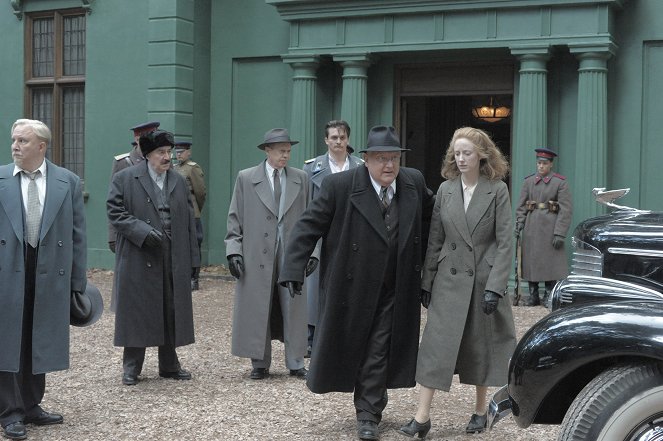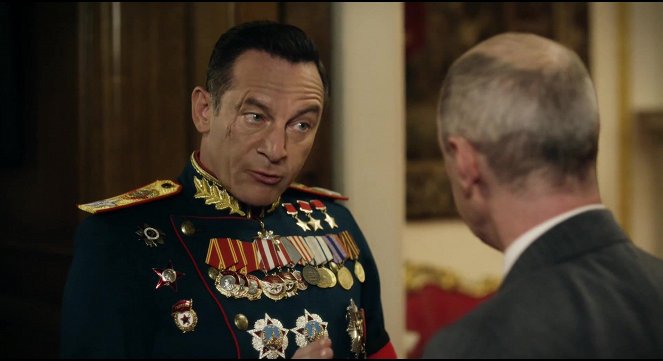Directed by:
Armando IannucciCinematography:
Zac NicholsonComposer:
Christopher WillisCast:
Steve Buscemi, Jeffrey Tambor, Simon Russell Beale, Jason Isaacs, Andrea Riseborough, Michael Palin, Ольга Куриленко, Rupert Friend, Paddy Considine (more)VOD (4)
Plots(1)
The internal political landscape of 1950's Soviet Russia takes on darkly comic form in a film by writer/director Armando Iannucci. In the days following Stalin's collapse, his core team of ministers tussle for control; some want positive change in the Soviet Union, others have more sinister motives. Their one common trait? They're all just desperately trying to remain alive. (Entertainment One)
(more)Videos (5)
Reviews (10)
The perfect film to “celebrate” the Victorious February. It’s very funny and dark, but also chilling when you realise that some of the events portrayed are not that far from the realities of a totalitarian regime. So, let’s hope that the gradual stupidisation of this country won’t make us go through something like this again. Otherwise, when compared to this film, the Czech satire President Blanik looks pretty sad. It’s on another level.
()
House of Cards demonises politics as a rotten evil, the Danish government presents an explosive ideal of how politics should look, the classic satire Yes, Minister ridicules the incompetence and stubbornness of top politicians and the Czech Kancelář Blaník takes the blame off of politicians and depicts professionally depersonalised and opportunistic lobbyists as the instigators of all evil. This map, on which every viewer can choose which of these image of politics suits his or her prejudices or ideals, is essentially supplemented by the British satirist Armando Iannucci, who, unlike all the others, depicts politics as uncontrolled chaos. Thanks to this, he is characteristically able to include in his screenplays, with the phenomenal – and for many epigones, inspiring - political sitcom The Thick of It at the fore, all of the above-mentioned views on politics through individual characters. The initial situation of The Death of Stalin is exactly Iannucci's characteristic political chaos, not only in the sense of what started immediately after Stalin's death, but also in the sense of the entire degenerate totalitarian regime of the USSR of late Stalinism, where only incompetents, nutcases, toadies, manipulators and morons remained in high positions, because all of the capable people had been eliminated.
()
To be honest, I wasn’t sure what to make of this film at first. It felt weird without Russian language, although I understand that it would be impossible. Some of the jokes didn’t work for me. Gradually, I started having fun, and by the time Zhukov arrived on the scene, I was laughing like crazy. The worst thing about the film was the casting of Stalin, which went horribly wrong and made Joseph Vissarionovich look like a parody of himself. By contrast, Robert Duvall was practically perfect in 1992 Stalin.
()
Making fun of a scum like Stalin and the Bolshevik cadres deserves praise, but I didn't find the film very funny. The humour was quite forced and ham-fisted, I guess I'm not the right viewer for such unbridled shenanigans. The casting, with the exception of Khrushchev and Molotov (the always reliable Buscemi and Palin) was one big blunder, especially with Stalin himself, who came across more like a nice old man than the charismatic, demonic Satan.
()
You almost want to say that this event could only be conceived as an absurdist comedy, if it indeed was a comedy, but in the end, it turns out that it can be a funny comedy that is clever, but at the same time presents historical events not outright faithfully, but does not distort them that much - only with the humor.
()
Gallery (46)
Photo © Gaumont



Ads